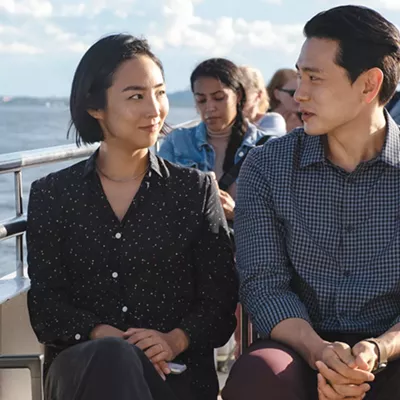Noah Baumbach's Marriage Story begins as its central marriage is coming to an end. Our two protagonists are fiercely independent, articulate, opinionated creative types: Charlie (Adam Driver) is the director of an avant-garde theater troupe in New York City; Nicole (Scarlett Johansson) is an actress and one of his primary collaborators. They're the kind of couple that seems genetically engineered to inspire New Yorker profiles.
The movie opens with dual montages, as Charlie and Nicole take turns reading laundry lists of the qualities they most love about the other. Nicole has a generous spirit and an infectious personality, is messy but in an endearing way. Charlie is thoughtful and organized, and he's able to tell you when you have food in your teeth without making you feel embarrassed. It's a sequence of romantic virtuosity, set to a swooning Randy Newman score, and we feel like we're watching two people fall for each other all over again.
And then there's a hard cut to Charlie and Nicole in a cramped mediator's office, sitting in chairs that might as well have a miles-wide gulf between them. What we've been listening to hasn't been a spontaneous outpouring of feeling, but rather an assignment from their counselor.
That tonal whiplash is typical of Marriage Story, which will be streaming on Netflix starting Dec. 6 and documents how a single crack in a relationship can spread into a cobweb of fractures. It is as funny as it is painful, a film that captures grubby mundanity as well as moments of explosive anger, and it's all depicted with the blunt honesty of events that were first rehearsed in real life. It's the sort of movie that a lot of couples will be watching through their fingers.
We get the sense that Charlie and Nicole have been drifting apart for awhile. He had a brief affair with his stage manager, which Nicole discovered by hacking into his emails. She's moving to L.A. to star in a new TV series, leaving Charlie behind to oversee a new Broadway production. Charlie is estranged from his own family, and he's obviously concerned about repeating the failings of his parents. Nicole has always felt like a creative subordinate to her husband, and sees her new gig as a chance to break out independently, as both an artist and a person. Their young son Henry (Azhy Robertson), meanwhile, is caught in the middle.
They've agreed to go through the divorce process sans legal advice, but Nicole eventually hires Nora (Laura Dern), a flashy family attorney who thinks she can get Nicole full custody of Henry. Charlie lawyers up, too, but he has a narrower pool to choose from — he's not allowed to hire any lawyer that has previously consulted with his wife — and he settles on Bert (Alan Alda), an old-timer who's willing to roll over and meet Nora's demands.
Every conversation between the former couple is a minefield. Forced, businesslike discussions of visitation rights and pick-up schedules veer head-on into hostility with a single off-hand comment, and slowly boil over into shouting matches. Charlie and Nicole are both shouldering the pressure of legal minutiae, and spending more and more time in antiseptic, fluorescent-lit meeting rooms and crowded courtrooms, where audiences of strangers joylessly eavesdrop on their personal problems.
The movie is really a showcase for its two main performances, and Johansson and Driver have never been better. Baumbach's script provides them with extended dialogue passages, some of which are shot in long, unbroken takes fittingly reminiscent of a theater piece. The movie's dramatic centerpiece is an extended argument in Charlie's barely furnished apartment, as he and Nicole deliberately try to hurt one another, finding the freshest emotional wounds and prodding at them mercilessly.
Baumbach's films can sometimes strain too hard for effect, and he often asks us to empathize with characters we hardly like spending time with. But here he exhibits a lightness of touch, both in the ever-shifting tone of the material and in the perceptive ways he checks the privilege of his characters. Like the work of James L. Brooks (particularly his 1983 film Terms of Endearment), Marriage Story captures the absurdity of life, how a pratfall can swing right into a moment of tragedy, and observes how the people who love you most are capable of hurting you most deeply.
It belongs in the rarified company of such great works as Ingmar Bergman's Scenes from a Marriage and Asghar Farhadi's A Separation, movies about long-term partnerships straining beneath the weight of a lifetime of microaggressions. It doesn't grandstand. It doesn't pick sides. Neither Nicole or Charlie is a villain, although we're often stunned by their penchant for cruelty, and we wonder if they really mean some of the things they say. And amidst the bitterness and brutal honesty are notes of warmth and compassion and comedy, and ultimately a sense that everything will be alright. It's easily one of the best films of the year. ♦



















